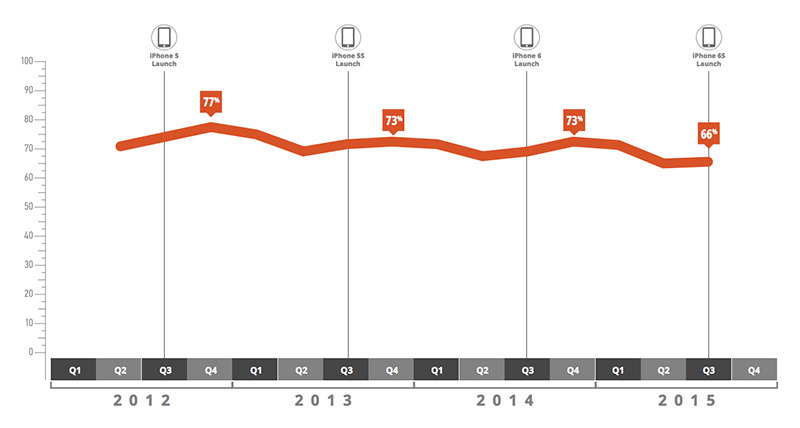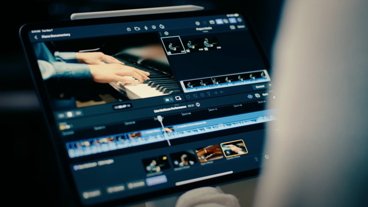Apple's annual iPhone refresh cycle, and a resurgence in iPad, helped iOS regain marketshare in the enterprise over the quarter ending in September, according to fresh statistics from Good Powered by BlackBerry.
As presented in Good's (formerly Good Technology) Mobility Index released on Tuesday, Apple's iOS accounted for 66 percent of enterprise device activations for the third quarter of 2015, up 2 percent sequentially. Apple normally sees an uptick in marketshare on the heels of new iPhone model launches, in this case the iPhone 6s.
While Apple over the past three months eroded Android marketshare from 32 percent to 31 percent, and Windows from 3 percent to 2 percent, the competing mobile operating systems are gradually closing the gap. iOS held 77 percent of the market at the end of 2012, a number that fell to 73 percent in 2013 and 2014. The dip can in part be attributed to flagging iPad performance.
For the third quarter, Good found 71 percent of enterprise tablet activations went to iPad, up from 64 percent at the end of June. By comparison, Android tablet share dropped from 25 percent to 21 percent, while windows moved from 11 percent to 8 percent.
The iPad previously dominated the category with a 90 percent share, but cheaper offerings from Android device makers spurred strong adoption rates in 2014 and early 2015. Apple's tablet marketshare was pegged at 81 percent as recently as March.
Breaking down adoption by sector, iOS commanded 83 percent of public sector activations, 77 percent for financial services, 68 percent for insurance and 77 percent of education. Google's Android leads in high tech and transportation, where it is running on a respective 52 percent and 50 percent of all devices.
Secure app development is experiencing massive growth on all platforms, as activations on the Good Dynamics Secure Mobility Platform were up 30 percent for the quarter, or 188 percent year over year. For all industries save fore retail, secure browsers proved the most popular app category, while custom apps, secure IM, document editing and document access rounding out the top five.
Good Technology, now a subsidiary of of BlackBerry, aggregated activation data from its global customer base of more than 6,200 organizations spread across 189 countries.
 Mikey Campbell
Mikey Campbell







-m.jpg)






 Marko Zivkovic
Marko Zivkovic
 Mike Wuerthele
Mike Wuerthele
 Christine McKee
Christine McKee
 Amber Neely
Amber Neely
 Sponsored Content
Sponsored Content
 Wesley Hilliard
Wesley Hilliard

 William Gallagher
William Gallagher








12 Comments
Whether it’s good news or bad news for Apple keep in mind that these analytics and statistics are produced by companies with clients that pay for the information. The information is used in various ways such as marketing, business models, future direction initiatives, etc. In the case of Apple it’s been pretty clear for years that these studies are used to manipulate AAPL stock and so are suspect from the get-go.
Seeing Microsoft go from 3% to 2% is so sweet having been in the trenches back when Apple was in enterprise and IBM and Microsoft forced it out. I realize this is only mobile but these days what else makes money? Nice pay back that IBM switched horses too. Got to love that. It can't be long before Macs start pushing out PCs in enterprise too.
Seeing Microsoft go from 3% to 2% is so sweet having been in the trenches back when Apple was in enterprise and IBM and Microsoft forced it out. I realize this is only mobile but these days what else makes money? Nice pay back that IBM switched horses too. Got to love that. It can't be long before Macs start pushing out PCs in enterprise too.
Don't assume that if your work gives you a Mac, you will be able to use it just like your personal home computer. There are still plenty of ways for IT departments to screw Mac users. For example:
Only allowing people to purchase the lowest end Mac with lowest price, slowest CPU, least memory, and slowest storage. For laptops, they may only allow the lowest end 11 inch MacBook Air. For desktops, they may only allow the lowest end Mac Mini or possibly the lowest end 21 inch iMac. Meanwhile, PC users will get faster hardware, more memory, and SSDs instead of hard drives. The company will justify the crippled Macs based on price alone (Apple is partly to blame for this, with their crippled low end models). You may try to argue reliability and support costs vs. PCs in an attempt to get a better Mac, but it won't matter since purchasing and support come from different budgets and they will not transfer money back and forth.
If you work in any decently sized company, end users will typically be set up with no admin access on their computers. The computers can be so heavily restricted that users won't be able to do even basic tasks like change a desktop picture or screensaver. Macs will also be exempt from OS X upgrades because IT will not want to spend time learning a new version of OS X. And if you try to bring in a portable hard drive with your own boot system, IT can lock down your Mac with a firmware password to prevent external booting. Or they can just have you fired for violating some company IT policy.
I have been in companies where the Macs were set up so improperly, IT made so many unneeded system modifications, it caused so many issues that the users were begging to get PCs. Whether this was done through incompetence or intentional sabotage remains to be seen.
And the best one of all: "You can have a Mac as long as it runs Windows only. Best of both worlds."
Certainly less risk of viruses still...
Now that Blackberry owns Good, why aren't their enterprise numbers showing up?